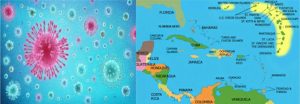
(Reprinted Miami Herald, 3-2-2020)
The first confirmed cases of coronavirus are being reported in the Caribbean, after authorities in the Dominican Republic on Sunday confirmed that an Italian national was checked into a Santo Domingo hospital over the weekend.
In addition, the Regional Health Agency of Guadeloupe confirmed three cases after a resident of the French overseas territory of St. Barthélemy and his parents, currently in isolation in a hospital in St. Martin, tested positive for COVID-19. Caribbean health ministers and prime ministers, meeting Sunday to discuss how to confront the virus, were informed of the cases.
The arrival of the coronavirus in the Caribbean opens up a new front in the fight to contain the virus. This is especially true in the case of the Dominican Republic, which has a population of 11 million and shares a porous border with Haiti. A popular tourist destination, the Dominican Republic has frequent sea and air connections to Puerto Rico and the U.S. Eastern seaboard.
Haiti, trapped in a political vacuum and staggering under a broken healthcare system, is particularly susceptible to the spread of communicable diseases.
“The social disruptions … the circumstances make a mess for us and for the patients. People need help but can’t get somewhere and that makes it worse for them,” said Father Richard Frechette, the founder of St. Damien’s Pediatric Hospital and St. Luke Foundation in Port-au-Prince, which provides medical care to over 60,000 patients a year.
Dominican Republic Health Minister Rafael Sánchez Cárdenas on Sunday said that a 62-year-old Italian had arrived on the island on Feb. 22 and was hospitalized on Saturday, making it likely that others were exposed. Local media reported a French tourist is also under observation.
Puerto Rico Secretary of State Elmer Román on Sunday said he was in touch with Dominican authorities and was trying to find out if Puerto Rican travelers may have shared the same hotel as the sick Italian tourist. Puerto Rico will also require all charter flights coming from the Dominican Republic to land at the international airport in San Juan, where health officials are on call to evaluate incoming passengers.
“The government of Puerto Rico is willing to provide all the help and support that they [the Dominican Republic] might need,” Román said in a statement.
The health ministries in Jamaica and Trinidad and Tobago last week announced that they had expanded travel restrictions related to coronavirus to also include Italy, South Korea, Singapore and Iran. The countries, along with other Caribbean nations had previously banned all flights from China.
In Haiti, health providers and government officials have been meeting for the past month to prepare for the coronavirus, said Frechette, a Roman Catholic priest who is also a medical doctor.
Frechette said his team is working with the Ministry of Health on being part of the national plan to confront the challenge. They have gowns and masks and they also plan to follow World Health Organization protocols. However, quarantining people in Haiti could pose a huge challenge due to the number of people living in small spaces and the lack of adequate facilities, he said.
With the confirmation of the virus in the Dominican Republic, Frechette fears it may be “just a matter of days,” before COVID-19 arrives in Haiti.
“We are hoping this flu-like illness won’t take up in hot areas like it does in cold areas,” he said. On the positive side, it appears that the mortality rate of coronavirus is similar, if not a little less than, that of cholera in Haiti, which killed 3 out of 100 individuals, Frechette said.
‘It seems that most of the mortality is among people above the age of 50 or 60 — a lot like our cholera fatalities, which were people who [also had] tuberculosis, HIV, skyrocketing blood pressure. Those are some hopeful points,” he said.
The problem in Haiti, however, is that due to the country’s weak health system and deep poverty, almost everyone has some underlying health problems because of the lack of access to healthcare. “It could lead to a much higher death toll,” Frechette said.
The spokesman for Haiti’s Ministry of Public Health and Population, Samson Jean Louis, said the country has received testing kits and the National Public Health Laboratory has the capacity to test for COVID-19. Meanwhile, health authorities, he said, are educating the public on the importance of hand washing and covering a cough or sneeze. They are also questioning travelers and taking their body temperatures at the two international airports as part of a screening for the virus.
“The ministry has already identified areas in the 10 departments of the country that could be used for quarantine if necessary,” he said. “For the moment, at this stage, we are prioritizing home quarantines. But depending on the path and evolution of the situation, we plan to use other types of quarantines.”